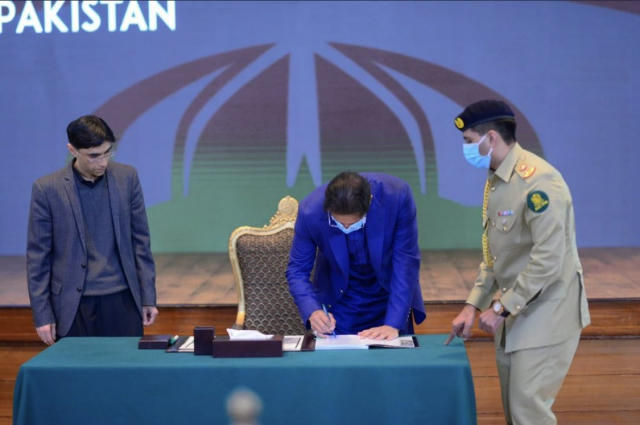IMF conditions enfeeble state's security: PM
Premier unveils country's first-ever citizen-centric National Security Policy

Prime Minister Imran Khan on Friday said that abiding by the terms imposed by the International Monetary Fund (IMF) in exchange for support came at the expense of the state’s security, lamenting that the decades-old logjam had kept the country under the thumb of the Fund.
The premier was addressing the launch ceremony of the country's first-ever National Security Policy (NSP).
He unveiled a public version of the country's first-ever National Security Policy, which defines the trajectory of the country in the coming years and underscores economic security.
Highlighting key facets of the policy, PM Imran regretted that subsequent governments since the country's inception had solely focused on military security and never planned beyond it, adding that economic independence had been barely the consideration of any government.
"We approach IMF under duress as in the end, only IMF is ready to help us and provide the cheapest loans. We have to abide by their conditions, and as a result, impose a burden on the people."
The premier noted that when the country's economy is weak, it weakens its defence. He said no previous government focused on sustainability.
He stressed that Pakistan needed to have inclusive growth, but "compulsions to acquire loans from institutions like the IMF put the national economy at risk".
‘Policy finalised after complete civil-military consensus’
The original 100-page national security policy remains under the wraps while only the 60-page public version was made unveiled.National Security Adviser Dr Moeed Yusuf said there was a national consensus on the new policy.
The new five-year national security policy was launched at a time when the country was facing multiple security, economic and foreign policy challenges. The new security policy has exclusive chapters on internal security, economy, military and defence, foreign policy as well as population/migration, water and food security.
“The policy articulates a citizen-centric compressive national security framework for Pakistan whose ultimate purpose is to ensure the safety, security, dignity and prosperity of our people,” read the official document.
The policy places economic security at the core of comprehensive national security, emphasizing a geo-economic vision to supplement the focus on geo-strategy, and recognizes that sustainable and inclusive economic growth is needed to expand the national resource pie.
This will in turn allow greater availability of resources to bolster traditional and human security. Appreciating this symbiotic relationship between economic, traditional, and human security allows the articulation of holistic policy actions that will prepare Pakistan to optimise national security outcomes in the coming decades.
The policy also captures ongoing trends in the changing world order and their implications for Pakistan. The emergence of multiple centres of economic and military power and a move towards a multipolar world are key features of the contemporary global landscape.
Pakistan’s location at the crossroads of historic confluence and regional flashpoints provides unique opportunities amidst global competition for power. The policy guidance in the document emphasises a proactive, forward-looking approach for Pakistan’s policymakers.
It recognises that a static or reactive outlook in a fluid global environment can have negative consequences and affect not only Pakistan’s external relations but also its internal security and societal harmony.
Recognising the need for flexibility in a global and national security landscape marked by fluidity, the National Security Policy is envisioned for a period of five years.
Under the guidance of the National Security Committee (NSC), and in coordination with the Office of the National Security Adviser, the NSD will review and recommend updates to the Policy on a yearly basis, when a new government is formed, or in case of a major event that has far-reaching implications for Pakistan’s security.
Economic security
Pakistan’s vital national security interests are best served by placing economic security as the core element of national security, according to the new security. The country’s security imperatives in the next decade will be driven by the need to realise its economic potential while ensuring national cohesion, territorial integrity, internal security, and citizen welfare.In the context of comprehensive national security, achieving economic security is predicated on an expanding national resource pie and a redistributive model that can transfer the benefits of greater availability of resources to human welfare.
Sustainable and inclusive economic growth that expands Pakistan’s global economic footprint, reduces external economic dependency, and allows Pakistan to better leverage its resultant economic clout will also ensure our traditional security requirements are adequately resourced.
“The challenge before us is to move away from the traditional guns versus butter debate, instead of recognising that traditional and non-traditional aspects of national security must be linked through a symbiotic relationship.”
The sustained macro-economic stability needed for economic security is linked to two interconnected elements: first, through a development and growth orientation, regeneration of economic activity and domestic investment is achieved and then through an export, investment, and connectivity focus, opportunities for economic growth through a greater inflow of external resources and the consequent improvement in the country’s external imbalance are created.
“Pakistan is already focusing on both these elements of economic security through dedicated programmes and strategies,” says the paper. “What is envisioned here is also a psychological shift in the national approach that truly recognises the imperative of further enhancing economic security in the medium term to ensure comprehensive security in the long term.”
The National Security Policy recognises that the security and continued prosperity of Pakistan requires a graduated approach. It prioritises policy interventions deemed to have the greatest impact on the vital national security interests of Pakistan.
“Pakistan requires policy continuity to navigate evolving challenges and turn them into opportunities. The country can ill-afford policy reversals or changing interest in the implementation of agreed major policy directions.
Policy continuity should be ensured through democratic processes. The National Security Policy recognises this and proposes dedicated strategies to create broad consensus on important national security issues that should not be affected by political differences,” the document reads.
Zero tolerance to terrorism and extremism
“The most acute form of efforts to undermine stability and national harmony of a society is terrorism,” says the policy.It says Pakistan pursues a policy of zero tolerance for any groups involved in terrorist activities on its soil.
With national resolve and dedication, Pakistan has fought one of the most successful wars against terrorism in the past two decades. Despite this success, the threat remains. “The employment of terrorism has become a preferred policy choice for hostile actors in addition to soft intrusion through various non-kinetic means.
Terrorism is also being used to disrupt and delay development initiatives.”Pakistan has been acknowledged globally for taking positive strides towards creating a strong financial monitoring system to prevent terror financing.
The state has also undertaken special development projects in parts of the country previously affected by terrorism.Continuing this positive trajectory by strengthening police forces and associated counter-terrorism agencies, undertaking intelligence-based operations against all terrorist groups, preventing any use of financial sources for terrorism, addressing structural deficiencies and sense of deprivation in recruitment areas, and promoting a pluralistic anti-terror narrative will remain priorities for continued improvement in our internal security environment.
Violent Sub-Nationalisms
The document says fringe violent sub-nationalist tendencies have been exploited by hostile intelligence agencies that have provided support and sanctuary to subversive elements.The ideological undercurrent for violent sub-nationalisms exploits socio-economic disparities and governance gaps.
Pakistan will adopt a four-pronged policy of engagement: separating reconcilables from irreconcilables; cutting off recruitment; constricting financial sources, and pursuing targeted socio-economic policies to address governance-related concerns in regions where violent sub-nationalist elements operate.
The document notes that Pakistan is a diverse nation comprising various ethnicities, religious beliefs, sects, and languages. “Extremism and radicalisation on the basis of ethnicity or religion pose a challenge to our society.
The exploitation and manipulation of ethnic, religious, and sectarian lines through violent extremist ideologies cannot be allowed.”Inculcating interfaith and intersectarian harmony and societal tolerance in all its forms will be prioritised.
Cooperation of religious scholars from every school of thought will be elicited to expand de-radicalisation programmes and promote a united narrative against extremism. Action against those producing and disseminating hate speech and material will be swift and uncompromising.
Foreign Policy
In an evolving world order, Pakistan has adopted a dynamic and self-confident approach to fast-changing world order, says the document.“This requires bolstering traditional political diplomacy while refocusing our energies on an engagement under new realities.
Economic diplomacy in Pakistan’s context requires leveraging political relations for economic gains while building new economic partnerships to in turn support our political and strategic interests.” As trade and economic connectivity gain importance in a more connected world, Pakistan must ensure a greater focus on economic diplomacy with a human resource that has the right skill set to capitalise on economic opportunities across the world.
“Our geo-economically pivotal location affords Pakistan the ability to offer itself as a melting pot of regional and global economic interests through connectivity 34 initiatives.”
This remains a priority and its success requires regional peace and stability to which Pakistan remains fully committed, the paper says.The security policy says with a regressive and dangerous ideology gripping the collective conscience in Pakistan’s immediate neighbourhood, the prospects of violent conflict have grown immensely.
“The possibility of use of force by the adversary as a deliberate policy choice cannot be ruled out,” caution the paper. Pakistan, it says, is committed to defending its territorial integrity in response to any military misadventure. Requisite conventional capabilities will be ensured through astute investment in the constant modernisation of our armed forces without embroiling in any arms race.
In addition, indigenisation of defence production, 24 increased capabilities in network centricity, battlefield awareness, electronic warfare capabilities, and other force multipliers will be prioritised. Gains from economic security will allow additional resources to be allocated for ensuring the credibility of defence by acquiring capabilities in keeping with an expanding threat spectrum.
Kashmir
A just and peaceful resolution of the Jammu and Kashmir dispute remains a vital national security interest for Pakistan, says the paper.
“India’s illegal and unilateral actions of August 2019 have been rejected by the people of Indian Illegally Occupied Jammu and Kashmir (IIOJK). Indian occupation forces continue to undertake human rights abuses and oppression through war crimes, crimes against humanity, and genocidal acts in IIOJK.”
In addition, India continues to create false propaganda around the Kashmiri resistance to hide its illegal actions. Pakistan remains steadfast in its moral, diplomatic, political, and legal support to the people of Kashmir until they achieve their right to self-determination guaranteed by the international community as per 35 United Nations Security Council (UNSC) resolutions.
India
The policy notes Pakistan, under its policy of peace at home and abroad, wishes to improve its relationship with India.
A just and peaceful resolution of the Jammu and Kashmir dispute remains at the core of our bilateral relationship.
The rise of Hindutva-driven politics in India is deeply concerning and impacts Pakistan’s immediate security.
The political exploitation of a policy of belligerence towards Pakistan by India’s leadership has led to the threat of military adventurism and non-contact warfare to our immediate east.
United States
The document underlines that Pakistan and the United States share a long history of bilateral cooperation. “Pakistan does not subscribe to ‘camp politics’. We believe that our continued 37 cooperation with the United States will remain critical for regional peace and stability.”
“We seek to diversify this relationship through mutually beneficial engagements. Communicating Pakistan’s concerns to policymakers in Washington while seeking to broaden our partnership beyond a narrow counter-terrorism focus will be a priority,” the paper reads.
It further says Pakistan will continue to seek areas of convergence with the United States in trade, investment, connectivity, energy, counter-terrorism, security, and intelligence cooperation.The national security policy also highlights further strengthening relationships with China, Iran, Russia and Gulf countries.



















COMMENTS
Comments are moderated and generally will be posted if they are on-topic and not abusive.
For more information, please see our Comments FAQ